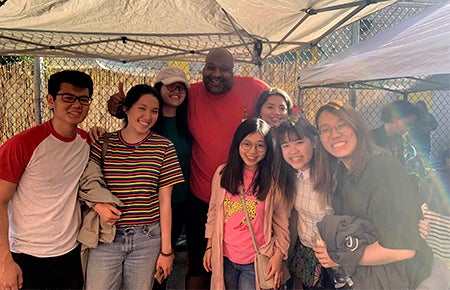
Students learn compassion for homelessness through service
Aidina Tleugabyl will never forget the 5-year-old homeless boy she met while serving at Los Angeles nonprofit School on Wheels.
“His siblings took care of him, bringing him toys. I saw that, despite their situation, they still share that sense of unity, of being a family and togetherness,” she said. “That warms the heart.”
Arriving in L.A. on May 27 with five other students from Hong Kong Polytechnic University, Tleugabyl joined three USC students participating in this summer’s inaugural Service Exchange Program organized by the Joint Educational Project (JEP) at USC Dornsife College of Letters, Arts and Sciences. JEP partnered with PolyU for the program, which saw participants explore issues of homelessness in L.A. and Hong Kong.
Homelessness in the City of Angels
In L.A., students visited Skid Row and served at different nonprofits. At the Union Rescue Mission and Midnight Mission, they prepared food and helped homeless clients with computer skills. At School on Wheels, students provided homework support for homeless youth. Students also participated in service field trips to St. Joseph Center to look at feeding the homeless and to LA Family Housing, where they explored the city’s housing issues.
During a week-long orientation, students heard from Seth Kurzban, a professor at USC Suzanne Dworak-Peck School of Social Work, who played a crucial role in providing an academic context for the program. During weekly seminars, Kurzban gave students a deeper understanding of the complex issues, such as mental illness, that contribute to homelessness.
Tleugabyl and the other students read widely about homelessness and watched videos about Skid Row and the vast homelessness crisis at the heart of downtown L.A. But nothing prepared them for what they would experience during a walking tour of the area led by Kurzban.
They were shocked to discover there were only nine or 10 public toilets in Skid Row to serve a homeless population of 30,000.

In Los Angeles, JEP Service Exchange Program participants attend a weekly choir practice on Skid Row organized by the nonprofit Urban Voices Project. From left, USC students Morgan Lu, Jessica Lai and Charlene Lam; “Big Joe” of the Urban Voices Project; and PolyU students Minju Kim, Aidina Tleugabyl, Geyya Wirasutta and Katie Ho. (Photo: Morgan Lu.)
Even more shocking was the smell.
“It’s not only the smell of urine,” Tleugabyl said, “it’s also the smell of someone who didn’t take a shower for days, maybe weeks; it’s the smell of rotten food; of rubbish thrown all around the streets; of unclean toilets; of drugs and cigarettes.”
Rather than feeling disgust, Tleugabyl, an electronics and information engineering major, was struck by the amount of information the stench contains.
“It can tell you a lot about Skid Row and how people live there,” she said. Even if she was only exposed to the smell and had not seen what Skid Row looks like, Tleugabyl said she would still be able to imagine something close to it from the stench alone. “It’s a reflection of how society has degraded,” she noted.
Tleugabyl said gaining deeper insights about the causes of homelessness enabled her to empathize with homeless people, rather than blame them for not working or trying hard enough. Now she sees homelessness as a social problem that everyone has a responsibility to help solve.
Raised in rural Iowa, sophomore Morgan Lu, an economics and mathematics major at USC Dornsife, was also shocked by L.A.’s homelessness problem.
Determined to help, he initially volunteered at a Skid Row nonprofit.
Lu says JEP’s program has given him a greater appreciation of the inequalities that exist within society. He now understands that many homeless people work hard, but struggle to escape their situation — sometimes due to prior circumstances, such as having been in foster care.
Gaining a global perspective

In Hong Kong, students, including USC’s Jessica Lai (right) and Ann Lau (center) from PolyU, joined members of the nonprofit Christian Concern for the Homeless Association to prepare nutritious snacks for homeless people. (Photo: courtesy of Jessica Lai.)
Arriving in Hong Kong on July 2, Lu and the other USC students attended lectures by professors and nonprofit housing organizations to learn about local housing issues. They also visited the homeless at a street park and helped deliver meals to the elderly living in public housing. Working with an NGO, they helped serve afternoon tea to homeless people, paint the walls of a hostel and plan activities for the residents.
While there’s not much homelessness visible on Hong Kong’s streets, making it harder to observe directly, Lu was surprised by Hong Kong’s substandard housing. Subdivided units often measure less than 150 square feet and usually house at least two people.
Lu said the program gave him a greater understanding of poverty and helped him gain a broader knowledge of the world. “It would be hard to fathom the tiny living conditions in Hong Kong without actually seeing them firsthand,” he said.
JEP’s goal, Assistant Director for Student Leadership and Development Sable Manson said, is to give students an opportunity to understand the complex issues surrounding homelessness from an intellectual standpoint while providing deeper understanding through service and experiential learning.
Through service, students are able to see homeless people in environments they can relate to, such as interacting with their families. Seeing them in a caring context can humanize students’ perceptions of homeless people, Manson noted.
“I think that goes a long way toward increasing compassion and overcoming our instinct to avoid thinking about the problem of homelessness.”